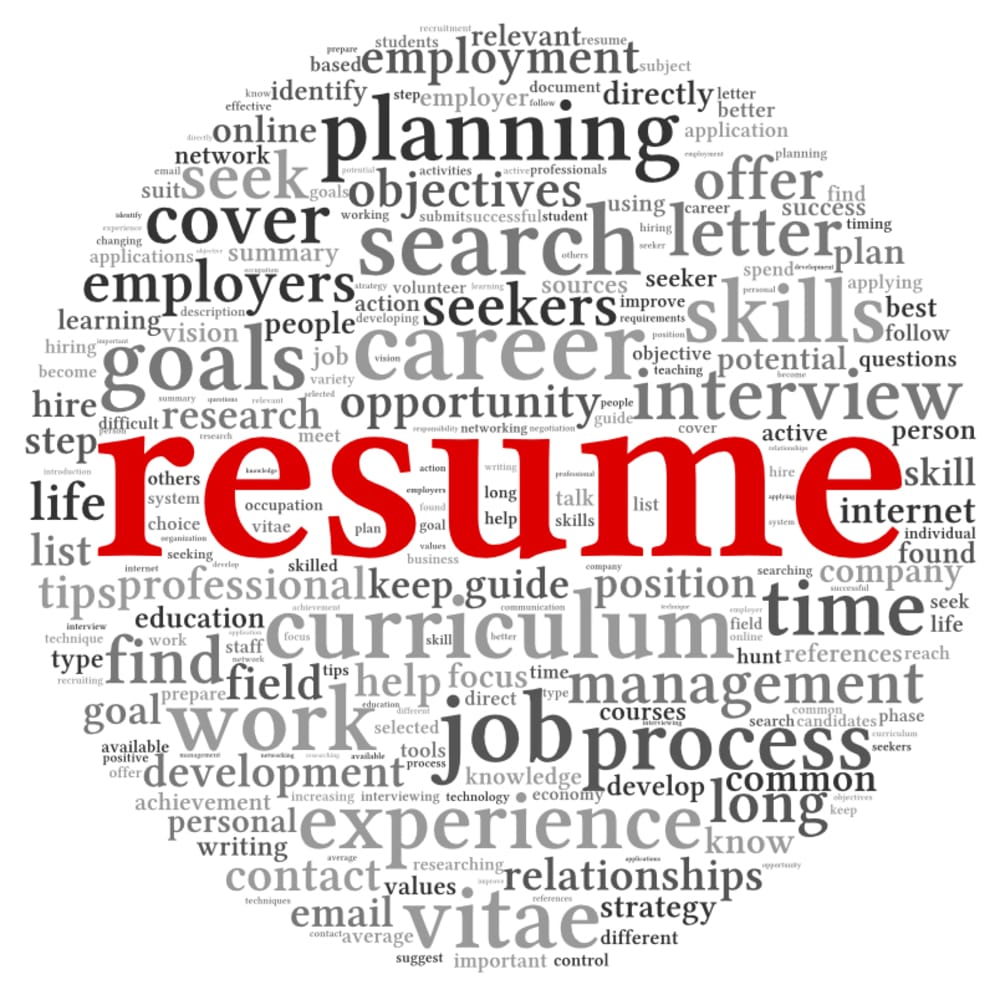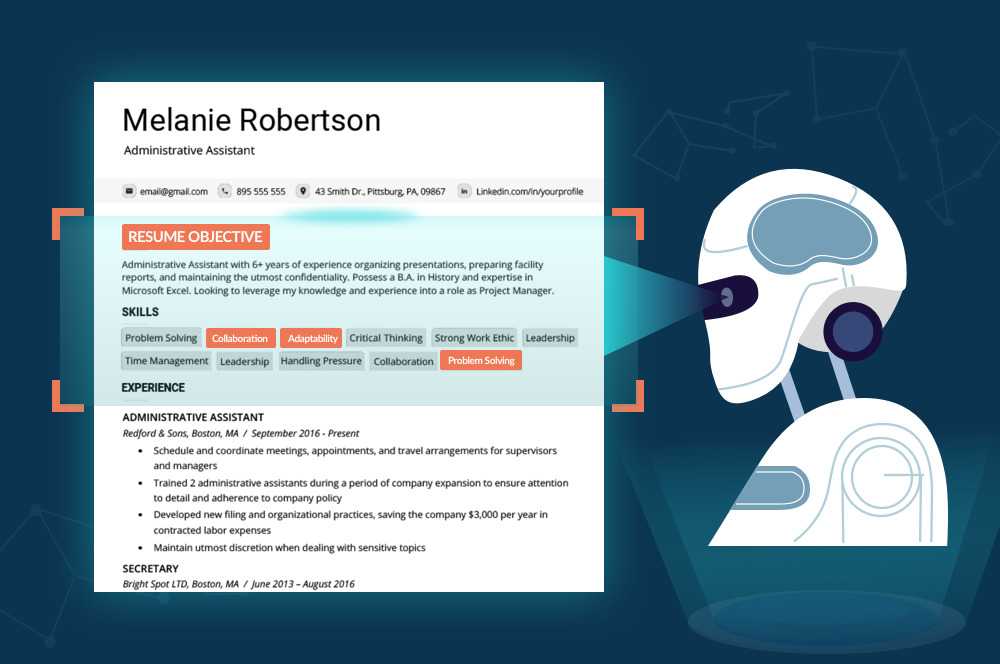by
Willette
 |
| https://images.squarespace-cdn.com/content/589f62ae6a49636c527f59b4/1535662057716-RDVO0SAWTO8O0QOSEYCN/ResumeWriting.jpg?content-type=image%2Fjpeg |
|
S |
ome people, like Jeff Hayden, a contributing editor to Inc.com, don’t think so. His post, Your Resume Is a Waste of Time: 8 Better Ways to Get Hired for the Job You Want, provides some useful tips. But, do any of the alternative strategies actually replace a resume? “Hiring managers and recruiters still rely on the resume,” Vicki Salemi, an advisor on the job-search portal Monster.com, told the New York Times.
That being the case, you probably already know that, after you submit your resume in today’s HR tech world, it will encounter “Cumbersome application systems, automated filters that identify keywords instead of talent…,” Hayden noted. As Sean Weinberg, whose free Web RezScore application reads, analyzes and grades resume, puts it, “Your resume has a lot of enemies” and “has to look out for itself.”
On that point, everyone agrees.
~Tip~
Take some time to check out jobscan.co, which provides some insight into how ATSs (Automatic Tracking Systems), like Taleo, work and lists the companies that use Taleo. The company to which you are applying for a job might be on the list.
|
|
Think of your resume (CV or curriculum vitae, which means “course of life” in Latin) as the historical story of your work (hard work) set in, preferably, a one-page time capsule that advertises/broadcasts your successes/achievements, skillsets and abilities. In summary, your value. Your value shouldn’t be distilled down to “empty lists of duties and titles.”
So, how do you go from lists of duties and titles to putting soul (e.g., flavor; density; strength) into your resume? Think QQK -
Qualitative,
Quantitative
Keywords
Qualitative addresses the quality of something. Quality, or high standards, applies to nearly everything. We look for quality when we shop for clothes; repairs for electronics, home or car; the food we choose to eat; is a restaurant clean, servers professional/polite, food prepared well/tasty?, etc. We even look for quality in people in anticipation of having a good relationship. In your resume, you communicate quality to perspective employers through “descriptive narratives.”
Descriptive narratives that contain QQK provide context and details about,
a) the circumstance and process through which you accomplished a task or initiated, developed and completed a project; the steps you took
b) how it mattered (i.e., impacted/benefited your former employer, employees, customers, clients, community)
Context and details help HR get a better sense of your abilities to focus, strategize and follow through.
In a resume, qualitative descriptive narratives should be short (two sentences max), and include “action verbs,” which powerfully underpins the “soul” in your resume. But, use them appropriately and authentically. Action words are seen in tortuously long job descriptions for some government positions, such as,
resolve conventional problems and situations
manage special projects and assignments
develop special reports
analyze and evaluate information and recommend alternative course of action based upon analyses.
Need help? Check out 185+ Action Verbs That Will Majorly Impress Hiring Managers, and ACTION VERBS & Transferable Skill Categories.
Quantitative – Put simply, quantity is anything that can be measured (e.g., the number of “likes” and “views” on social media, number of subscriptions to a YouTube channel, your bank account’s balance, how many steps you walk a day, your blood pressure numbers, how many schools, libraries, hospitals, restaurants, grocery stores, banks, etc. in your community and number of blocks or miles these services are from your residence). “Numbers are solid,” said Weinberg. “They’re persuasive evidence of your qualifications.”
But, you might wonder: What if I don’t have numbers? My previous position didn’t require data collection or measurements of any kind. You could “guesstimate” based on feedback (even in informal settings) from management, co-workers and/or clients. Your own records/files showing outreach and contacts (phone calls, emails, texts, social media, etc.) may also give you the capability to make a practical assessment or measurement.
Qualitative & Quantitative ~ Two Examples
1. Here’s an example of a bullet in a resume for a software developer:
· Mobilized and provided various support to communities and people donated using the software I created.
Suggestion: While the bullet contains a number of good action words (mobilized, provided, support, created), the applicant can infuse “soul” with qualitative and quantitative descriptions as follows (in parenthesis):
· Mobilized (qualify: mobilized who and how; quantify: how many were mobilized) and provided various support (qualify/specify: kind of support, how supported; quantify: how many people or groups supported) to such communities (qualify/specify: what communities; insert demographics, if possible; quantify: number of communities) and people donated (qualify: what people, are they in a particular profession, location, what did they donate? Money, time, supplies?, etc.; quantify: number of people donated; how much donated) using the software I created (qualify: software’s name; what it does; is it registered or copyrighted; how does it help users; quantify: year it was created, how long or time it took to create, number of users, how many users it has helped).
2. Here’s Crook’s example of a bullet on a career counselor’s resume:
· Assisted clients with resumes.
Crook recommended the following qualitative and quantitative upgrades:
· Worked with 25 clients on resumes, job search strategies and networking, 24 of the 25 clients found employment.
Suggestion: An applicant could give HR a bit more context (soul) by qualifying the “job search strategies and networking” section in the bullet with one or two specific “job search strategies” (e.g. “scheduled client to attend ABC Job Fair”), with whom they networked. The name of a person(s) or company networked with is optional. But, including the type of industry or profession gives a resume more depth/soul. For example, if the applicant “networked” with a person or persons in a decision-making position in a particular industry, such as fashion, health, education, legal/law, construction, music, engineering (mechanical, civil, chemical, electrical), etc. Again, qualitative descriptions/narratives provide context.
Keywords Matter
You’ve probably heard that mantra often. Well, it’s true. Your descriptive narrative should contain keywords that are germane to the position for which you are applying. Keywords, like a jet engine, propels your resume past electronic hurdles. You can mine keywords from the job description, so take the time to read it carefully. Suppose, for example, a job description calls for “expertise in SUMPRODUCT.” (According to excelchamp.com, SUMPRODUCT “is the most useful and power function in Excel.”) So, instead of simply saying on a bullet: “Proficient in Microsoft Excel,” specify with the keyword “SUMPRODUCT.” And, add a couple of other software functions (tools or applications) with which you have experience.
In sharing scholarship and employment opportunities with my email contacts, a position for a senior data analyst on Clooney Foundation for Justice’s website came to my attention. Within the long job description that contains a lot of keywords, part of one sentence reads, “They will be a self-starter….” Keyword? “Self-starter.” Here is where an applicant, who initiated (self-started), then created/developed and executed a program, project, software, etc., can infuse “soul” into his or her resume by qualifying and quantifying the achievement and the product's success.
Keywords can also be a part of industry-specific language/terminology (like particular software features). Even if such keywords are not in a job description, taking the initiative to add a couple of terms unique to your particular profession gives more context and details (quality/soul) to your resume’s descriptive narratives. Trade industries (e.g., mechanics, plumbers, construction, masonry and so on), have terms for tools and tasks (and software) exclusively linked to the job. In an automobile mechanic’s world, for example, tools - battery analyzer, wrench/spanner, trolley jack, lift gate, and so on - an applicant may have mastered should be included on their resume.
~Tip~
You’ll also find valuable keywords on the company’s website when you do a search of the employer to whom you’re seeking employment. Taking the time to search helps you get a better overview of the company’s culture, vision, mission and ethics.
|
T |
he bottom line is, by working through the QQK process, you’ll be delighted to witness your resume’s SOUL emerge, enjoy the benefits of a carefully crafted resume, and even conclude that resumes are ABSOLUTELY necessary.
Magic, Miracles & Blessings, 💓
Willette
~ P.S. ~
Infusing “soul” into you communication also works for scholarship essays and business plans.
~ P.P.S ~
To help you along your resume building and job search journey, Indeed.com, lists 12 Job Searching Strategies That Work, along with descriptive narratives.


No comments:
Post a Comment